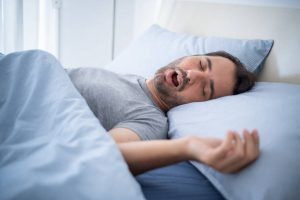 Sleep apnea is a common breathing disorder that affects millions of people around the world. However, many people aren’t aware they have the condition. Here are 6 facts about sleep apnea you should know.
Sleep apnea is a common breathing disorder that affects millions of people around the world. However, many people aren’t aware they have the condition. Here are 6 facts about sleep apnea you should know.
1. 18 Million Americans Have Sleep Apnea
Healthcare professionals estimate that 1 in every 15 Americans has sleep apnea. Obstructive sleep apnea is the most common form. It causes frequent pauses in breathing from an obstruction in the upper airway that’s created by the soft tissues in the back of your mouth. Your tongue and the muscles in your throat can collapse to block your airway, causing you to stop breathing potentially hundreds of times per night.
2. 90% of Cases are Undiagnosed
Although gum disease is common, healthcare professionals report that 2-4% of Americans have sleep apnea. Unfortunately, most people aren’t diagnosed. Sleep apnea can cause diverse symptoms, which can often be attributed to something else. Not to mention, symptoms occur while you’re sleeping. Many people aren’t aware there’s an issue until someone in their home brings it to their attention.
3. Snoring Isn’t the Only Symptom
Snoring is a common sign of sleep apnea, but it’s not the only symptom. It is also known to cause morning headaches, waking with a dry or sore throat, and daily fatigue. You may also wake up throughout the night choking or gasping for air.
4. Sleep Apnea Affects Your Health
Poor sleep quality is not the only complication of untreated sleep apnea. Each pause in breathing depletes your body of oxygen, which can cause serious and potentially life-threatening issues down the road. Untreated sleep apnea is attributed to an increased risk of heart attacks and strokes. It can also cause memory loss, cognitive changes, depression, and anxiety.
5. Sleep Apnea Increases Risk of Accidents
If you’re not getting adequate rest, sleep deprivation can occur. Not only can it significantly affect your quality of life, but it also increases your risk of workplace and auto accidents. Sleep apnea sufferers are 6 times more likely to experience an auto accident from drowsy driving.
6. A CPAP Isn’t the Only Treatment
A CPAP is the most traditional treatment for sleep apnea, but it’s not the only option. Patients with mild-to-moderate cases of obstructive sleep apnea can benefit from an oral appliance. The comfortable, custom-fit device positions your tongue and jaw to prevent them from blocking your airway. It can significantly reduce sleep apnea symptoms by stopping pauses in breathing.
If you have signs of sleep apnea, don’t spend another night tossing and turning. Your sleep specialist has the solutions you need to breathe better.
About Dr. Carol Morgan
Dr. Morgan earned her dental degree from the Medical College of Virginia School of Dentistry and has regularly pursued advanced education in many specialties, including TMJ treatment, full mouth reconstruction, and sleep apnea. She provides the most up-to-date solutions in dentistry. Dr. Morgan is a member of several professional organizations, including the American Dental Association. Contact Dr. Morgan through her website or call (757) 320-5645.
